PRESERVING A MILITARY LEGACY FOR FUTURE GENERATIONS
The following Reflections represents SFC David McConnell’s legacy of his military service from 1980 to 2000. If you are a Veteran, consider preserving a record of your own military service, including your memories and photographs, on Togetherweserved.com (TWS), the leading archive of living military history. The following Service Reflections is an easy-to-complete self-interview, located on your TWS Military Service Page, which enables you to remember key people and events from your military service and the impact they made on your life. Start recording your own Military Memories HERE.
Please describe who or what influenced your decision to join the Army.

I believe I knew I would be a Soldier when I grew up at about age 5. My childhood next-door neighbor shared a story about when I was that age. She said that I was marching up and down the driveway between our two houses with a broom over my shoulder. When she asked me what I was doing, I just snapped around and said, “I’m Guarding,” and went right back to marching up and down the driveway.
Of course, growing up with Combat!, Rat Patrol, and a slew of very cool WWII war movies did have its’ influence on me. And let’s not forget G.I. Joe, rifles and guns that shot cap-driven plastic bullets, with a whole bunch of plastic Army soldiers.
Another significant impact on my early childhood was the U.S. Army DESERT STRIKE exercises conducted in and around my hometown of Needles, California, in the 1960s’. I still remember the “Real Life” Army Soldiers walking around our neighborhood. My Uncle was Drafted in 1966 and sent to Vietnam to serve. While over there, he purchased two sets of children’s khaki uniforms and a set of green U.S. Army cotton, complete with name tags and U.S. Army. I can still remember wearing these uniforms to school. One set of Khakis was Dark Green and the other Tan. As you might imagine, I wore them until they became utterly unwearable. I turned 20 years of age in Basic Training, so I guess it was time for me to get on with it.
Whether you were in the service for several years or as a career, please describe the direction or path you took. What was your reason for leaving?
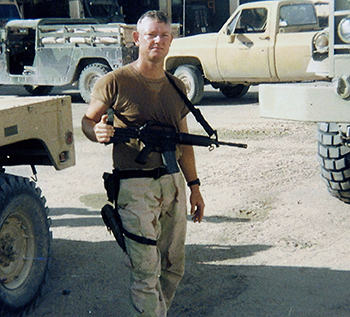
It was my original intent to do 30+ years in service and be a true “Lifer.” Although I had a MOS’ in Administration, I was a field Soldier. Garrison life was a total bore, and that boredom got me into a lot of trouble off-duty. However, when deployed, I was in an environment where I could thrive. The more challenging the environment, the better I got; that was just my niche during my service. Fortunately, or unfortunately, depending on how you look at it, my Generations’ warfare was in and out with rapid and aggressive deployment responses. URGENT FURY, JUST CAUSE, DESERT SHIELD/STORM, and RESTORE HOPE were all deployments that I could personally attest to.
Additional worldwide deployments were going on as well during some of these operations. That was just the nature of our warfare during my period of service. I spent 13 of my 20 years of service on Parachute status, so the opportunities I had to be the “Tip of the Spear” were almost guaranteed.
Additionally, I am not a Purple Heart recipient, and I never got a scratch on all of the deployments I made. Did get sick during the Gulf War after vaccination, but I never lost pace during deployments other than the couple of days that I was laid up. I simply reflect on this as Devine Intervention, period.
However, I did not come out of all of these deployments unscathed. During my last Combat Deployment, an epiphany came upon me, and it was not a good one. Without going into many very depressing details, I requested to be redeployed back to CONUS before completing the Operation, something I had never done before.

So, there I was, 14 years in service, and I was completely and utterly DONE! There just wasn’t any gas left in the tank, and I had six years to go to make minimum Retirement. That last six years of service can best be described as “A Living Hell.” By this time, my undiagnosed PTSD was in full swing. The inability to sleep, the constant anger and rage, and self-medicating with alcohol (1 case of beer = sleep) all led to a complete “Crash and Burn” on my part. I think the best description of my untreated wound can come in the form of a conversation I had with my Branch Manager before leaving South Korea.
My Branch Manager seemed elated that he was informing me that my next assignment would be at the Pentagon. I told my superiors that there was no way I was going to the Pentagon. He then responded with, “Well, if you want to make Master Sergeant, you will take this assignment.” Poor guy, I unloaded on him with both barrels and told him he could send me to one of three places, “Fort Bragg, NC; Fort Bragg, NC; or Fort Bragg, NC” I then told him that if he could not accomplish this, he could put me out right here and I would live on the South Korean streets as a worthless bum (which is pretty much how I felt) leaving my wife and two children back in CONUS to fend for themselves. My next Branch phone call was from my Senior Branch Manager informing me I would be reassigned to Fort Bragg, NC. If it were not for my support through my Chain of Command at Fort Bragg, I could not have retired honorably.
If you participated in any military operations, including combat, humanitarian and peacekeeping operations, please describe those which made a lasting impact on you and, if life-changing, in what way?
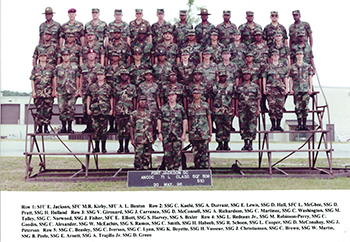
My last “Crack out of the barrel” was Somalia in 1993 while assigned to the Special Operations Command Central (SOCCENT). After the debacle in Mogadishu, we rolled out with a JSOTF (Joint Special Operations Task Force) that consisted of a Forward Command and Control element and 4 AC130 Gunships from the Air Force Special Operations Command (AFSOC). The Somalis were using civilian vehicles to mount and carry heavy armament. They were referred to as “Technicals,” Within four days of our arrival, not a Technical was moving in Mogadishu, and they had all been destroyed by our AC130s. We were able to put an aircraft on station 24/7.
With our combat operations being thwarted almost daily by bureaucratic mandate from the Embassy, myself and Gunnery Sergeant Tim Hess ran several convoys to and from the Embassy Compound and the Port. None of our Convoys were ever attacked. HUMINT (Human Intelligence) later reported that the local population was referring to us as “The Kaboys,” a poor pronunciation of Cowboys. We were very intimidating coming off the Embassy Compound with guns bristling and faces covered. It worked. Personally, I thrived in the Special Operations community, and you could accomplish things rapidly and outside of the box. Case in point: One of my Sergeants came up to me and asked if he could get a ride on one of the AC130 gunships. I took this to Gunnery Sergeant Hess, and he came up with an absolutely brilliant exchange plan.
We would set up and conduct a CQB (Close Quarters Battle) Course for any of the AC130 Crews who wished to participate in exchange for a couple of rides on the aircraft. Additionally, I coordinated with the Norwegian contingent and cut a deal with them to use their 9mm HK Carbines on the course to participate in the training. Gunny and I put about 75 personnel through the course, both Air Crews and Norwegians. All of this was planned, coordinated, and executed within 48 hours. I will never have to take a ride in an AC130 aircraft; the precise detail, excitement in presentation, and gratitude expressed by my Sergeant were just like taking the ride myself. After watching nightly on the TV news, the demise of our deployment, I had finally had enough. Obviously, our cause was lost in politics, and I went to my Commander and requested permission to redeploy back to CONUS (Continental U.S.). The Colonel accepted my request with a heartfelt handshake, and a “Wish I were going too.” The next day I was on a bird-headed home. Being a Veteran of combat deployments to Grenada (URGENT FURY), Panama (JUST CAUSE), and first plane in for Desert Shield/Storm, I had never known the sting of defeat, only victory.
I can relate so well to my Vietnam-era brothermen; the soldiers did not withdraw from the conflict, and our political leaders did. I know that the emotional wound that I carry from this experience is forever lasting in my own heart. The frustration of “unfinished business” and good lives wasted haunts me to this very day.
In 2010 I was formally diagnosed with PTSD (Post Traumatic Stress Disorder), having destroyed marriages and civilian careers in the process. At 50 years of age, I was medically unemployable and forced to retire from the workforce. Something I was not prepared to do.
Did you encounter any situation during your military service when you believed there was a possibility you might not survive? If so, please describe what happened and what was the outcome.
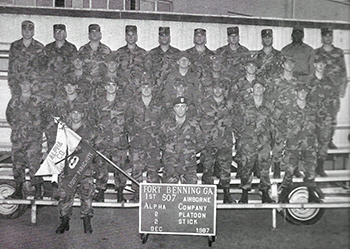
I deployed numerous times in my 20-year career, and I don’t think I ever “Went-In,” thinking I might not survive. I will be sincere that my very first combat deployment scared the heck out of me, but after that, it pretty much just became business as usual. I never got wounded on the battlefield, but it wasn’t for lack of trying. The opportunities for my life to be taken were countless. I attribute my combat survival to Devine Intervention; it is that simple.
At the beginning of my last year of Military service, I contracted a Flesh-Eating Virus. The actual Medical term for it escapes me; however, there was only a 5% chance of survival if you were diagnosed with it, and that was only if it were caught within 24 hours of infection. I remember waking up on a Monday morning for P.T. (Physical Training) and having an odd pain in my right groin. The virus was attacking the lymph node in my right leg. By the time I got to Sick Call, the pain had become excruciating. I guess they thought Ol’ Sarge was just trying to get out of a P.T. test or something because I sat at the clinic for what seemed like an eternity. By now, I am starting to moan in agony and can barely walk.
Finally, after getting tired of my increasing moaning, they told my wife of the time to drive me up to the hospital for further evaluation. My wife literally carried me to our car and drove me to Womack Army Hospital on Fort Bragg. Once at the hospital, they tried to examine me at the E.R. By now, I am in complete agony, and my moans are now screams at any kind of manipulation to my right leg. Out of frustration, the E.R. Doctor doped me and stuck me in an Exam room to keep me out of earshot. It is a very good thing that my wife of the time was an Army 91C Nurse. After a bit of time secluded in that Exam room, I started to feel better; so much so I told my wife that we could probably go home. I still remember the insane look that she shot me. She said, “Mack, your skin is turning yellow, and you are showing signs of Jaundice. I think your Liver is shutting down.” And with that, out the door, she went screaming for a @#$% Doctor to get down there to look at her husband, who was going into shock. I must have passed out during this process because my next memory is being in the I.C.U. with multiple tubes jutting from my arms.
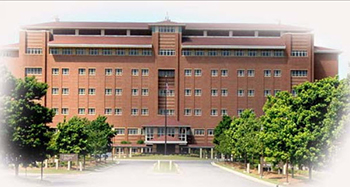
My right leg was heavily bandaged, and I had a huge Morphine dispenser along with my I.V. bags. I was told that I had to have emergency surgery once my diagnosis was completed. They said they needed to “debreed” the wound and that I would be going in again very soon. I had a total of seven surgeries in four days. On one of these surgeries, a Sunday, I “woke up” in the recovery room too soon. I awoke to a pain that can best be described as a hand still inside my leg with its’ hand wrapped around the bone. The Surgery staff had all gone home, including my Doctor, who were all probably exhausted keeping me alive. I laid on that Hospital gurney for over an hour, screaming at the top of my lungs for someone to please kill me! I had to wait for someone authorized to dispense the meds required to put me back under.
By this time, my Chain of Command went into full gear. I had to be sedated if there was to be any manipulation of my right leg, including the changing of bandages. This required an officer from my Unit to be present whenever I was “put out.” Because of my duty assignment with U.S.A.S.O.C.; 2 doors down from the C.G., and the classified nature of my duties therein, this was standard procedure. It would bite me real hard later. My Unit assigned a Doctor from the C.A.G. to attend to me. This man saved my life.
During my last surgery, I died on the operating table to “debreed” the wound. I was Dead for several minutes while my Doctor fought to bring me back. I had alot of Medical visitors after that who were just simply amazed that I did not have permanent Brain damage after being Dead for so long. Unfortunately, this led to a chain of events that haunt me to this very moment.
My Doctor realized that I would not survive any more surgeries. My blood veins started to collapse because of all of the antibiotics and morphine I was on. Toward the end, I had I.V.s sticking out of the veins in my feet. He also noted that amputation was not viable as I would probably not survive that either. He then came up with the idea to place me into a Hyper-Barrack Chamber and force pure oxygen (known to kill the virus) into the wound. Revolutionary thinking, but that was the nature of our Silent Warriors. My Unit maintained a Hyper-Barrack Chamber for our Divers at Fort Gordon, Georgia. My Doctor removed my stitches (I had been “debrided” to the bone) and left the wound simply bandaged? I needed lots of Morhpene for that one.
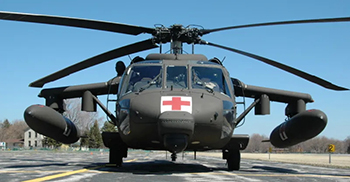
My Doctor informed Womack that I would need to be Air Lifted to Fort Gordon, Georgia, for treatment. Womack told him that they did not have a MEDEVAC to spare and only offered a very long Ambulance ride to Georgia. My Doctor informed them that I would not survive an Ambulance ride to Georgia and then notified my Boss of the situation.
By now, my Commander, LTG W.P. Tangney, was being briefed twice a day on my condition. My Doctor later told me that within 15 minutes of his conversation with General Tangney, the Generals’ personal Huey was on station for the movement. What a sight. Blacked-out bird with no tail numbers or markings. Just a make-shift Red Cross pasted on each passenger door. This one would bite me later as well.
Now, my Unit had assigned a Captain to me so that I could be watched while being put under. Imagine that Ol’ Sarge got a Captain assigned to him! He flew with me down to Fort Gordon and got me checked in to the hospital. He then left? It seems that his wife of the time was stationed at Fort Campbell, Kentucky, which is driving distance from Fort Gordon, Georgia. Having secured me at the hospital, he drove off to see his wife. Honestly, I would have done the same thing.
The next portion of this Nightmare event is difficult for me to present. Professionals told me that expressing and relating my Traumas’ of the past was good therapy. NOT IN THIS CASE! “Ghost pain is a very real event for me”; enough said.
Having arrived at the Fort Gordon Hospital; in a blacked-out chopper; with an Officer escort; and very little information or announcement on my arrival, I was visited by two Doctors assigned to the hospital. They had a brief conversation with me on my condition and then informed me they wanted to “take a look” at my wound. I informed them that I would have to be sedated, that I was not stitched, and that my bandages were the only thing holding the meat on the bone of my right leg! They must not have believed me. I cannot go into the details of this moment; they only stopped trying to remove my bandages because they got tired of my screaming and could see I was still “open.” Now my hearing and vision have always been exceptional, especially at night. As these two Doctors were leaving the I.C.U., I overheard one whisper to the other, “Wow! What a Wimp”. I was too exhausted to comment, or I would have.
Not long after that, I noticed a male and female Nurse conversing in whispers at the opposite end of the I.C.U. I “tuned in” and heard one say to the other, “What is this guy doing here. Doesn’t Fort Bragg have their own Hospital”? That was it for me! Time to let the “cat-out-of-the-bag” and shouted from my bed, “Hey Assholes, I didn’t ask to be here.” They looked at each other in complete shock and exited the I.C.U. Most promptly. Fortunately, I had no more “visitors” after this.
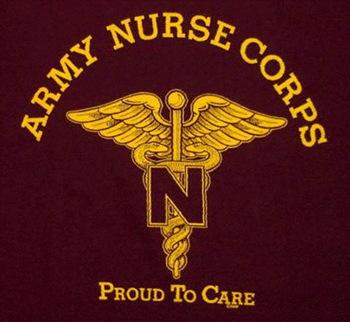
My time in the Hyper-Barrack Chamber did exactly what it was supposed to. When I first went in, they took an ink pen and drew a circle around the inflamed surgical point of my open wound. Within 2 hours, they drew another circle around the wound, which had receded to half of its’ original size. By the end of my second 4-hour treatment, the inflamed, red area had completely dissipated. I was cured.
I wish I could say that this was the end of my Nightmare, but I cannot. My physical recovery was pretty remarkable, and I attest this to the fact that I had been Alcohol and Tobacco-free since just before arriving back to Fort Bragg. Although I was not receiving any type of clinical mental help, I had networked a very good support group of individuals who each were teaching me how to cope with what I was going through in my life.
Right after I got back from Fort Gordon, a male Nurse came to me and said, “Mack, I need to take you down to a bath so I can clean your wound.” Of course, the alarm bells started going off in my head. I told him that the rules had not changed for my wound treatment as far as I knew. Where was my Captain? Did the order for this come from my Doctor? The young Specialist just looked at me and said, “Sarge, we gotta get this done.” And so I got to visit another room in the Womack House of Pain. To make a very long and painful story short, the young Specialist gave up after tiring of my screaming and actually seeing the wound. Ugly. When he got me back to my room, I could tell that he had been crying. I never saw the young Specialist again, and the experience was rough on both of us.
I learned alot about the drug Morphine during this period. First, it does not take the pain away. It only makes the pain manageable enough to provide comfort. Second, if the pain becomes excruciating enough, it will cut right through the morphine. I experienced this enough times to know without a doubt. Third, if you are on copious amounts of this drug, you cannot just simply stop taking it. The result is not pleasant. I found this out the hard way, of course. One morning a Nurse came in and lamented my rapid recovery from such a devastating ailment. She also stated that there was a Doctors’ note stating I was being considered for discharge. She then pointed to my Morphine dispenser (programed at 10-minute intervals) and said that we probably wouldn’t need it anymore. I was so excited about the prospect of going home that I said, sure, go ahead and take it, which she did. About 8 hours later, I was awakened from sleep by my body convulsing uncontrollably.
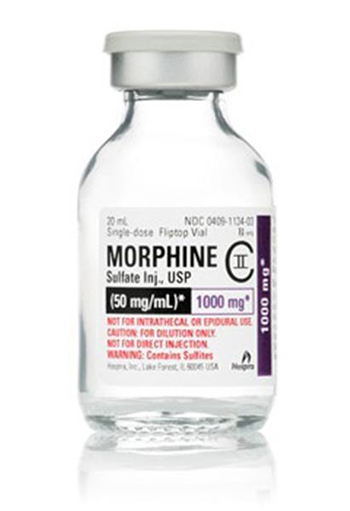
An alarm was sounded, and many Medical staff came in to see me doing the “Kick’n Chicken” on the bed. My body was convulsing so hard that I could barely speak. My heart rate and blood pressure were going off the charts, and no one knew what was going on? After about half an hour or so, my Doctor came in, took one look at me, and then to where my Morphine dispenser had been. He then exclaimed, “Where is his Morphine”! And without waiting for a response, I said, get me some Morphine now! I was on that drug in decreasing doses for two months after being discharged from the hospital to come off of it.
At this point, my recovery was going so well that my Doctor said I could go home; I had been in the hospital a couple of months by now. Since my wife of the time was an Army Nurse, my release was conditional upon the care that my wife could give me at home. She did an excellent job at taking care of me. However, during the second week of my arrival at home, my wife changed my dressing and stopped suddenly. She got over the wound and started sniffing real hard. She then got this sad look on her face and said, “Mack, your wound has Gangrene. We have to go back to the hospital.” I didn’t say a word. She packed me up in the car, and back to Womack we went. I did not speak until I asked for a blanket because I got cold. The shock was already beginning to set in, and suddenly, it felt like someone had just put me in a deep freeze. I started shaking uncontrollably and was going in and out of consciousness. It was so bad that I had to be sedated. My Doctor put me on another antibiotic, and I was back at home within a day or so.

This whole affair put me out of the game right up to my Retirement date. I still had scabbing on my scars while out-processing. And speaking of scars, I got some real doozies! Kudos to my C.A.G. Doctor not only for saving my life but for leaving me with some really cool Frankenstein “railroad track” surgical scars. And got to keep my leg to boot; what a guy! He was a Captain (P) when he was assigned to me. The last time I saw him, he was wearing Major Oak Leaves; guess once he cured a Flesh-Eating Virus, his promotion got advanced. Well deserved in my book.
As you might imagine, I suffer from what is called “White Coat Syndrome.” It is simply the fear of being in a Hospital environment, and it actually almost got me killed, again. Then, as of now, I was being treated by the V.A. When I would go in for my annual physicals, my blood pressure would be quite high. A medical history review could confirm my being prone to this syndrome, and my blood pressure issue would be waived. However, my blood pressure was so high that they almost didn’t let me leave on one particular visit. I am now on high blood pressure medication after my Doctor informed me that I was a very lucky man. Duh!
Before this event, I had already shown signs of P.T.S.D. and quite frankly was able to deal with it on my own and with the help of a good support group of friends for a while. Unfortunately for me, it would take several years and alot of loss for me to be formally diagnosed and treated. I have found that I have alot of company with this affliction, and it is most certainly life-threatening. It was only after a failed suicide attempt that I finally got the help that I needed for years. Pitiful! When I applied to the V.A. for compensation on my P.T.S.D. I had to be reviewed by a V.A. Mental Health Representative. I use the term “Representative” loosely for a reason! The “Doctor” who reviewed my claim had no business doing so in my book. As I was sitting there being reviewed it was apparent to me, through the non-verbal communication that this person was exhibiting, that she was absolutely disgusted by me. After the interview; and fighting to hold back vomiting everything I had in my system, I sat in my car in the parking lot, wishing I had never started this V.A. process. And, of course, the bone that the V.A. threw at me was a 10% increase to the 50% that I was already receiving for other physical issues, complete with V.A. math. There is no monetary award, but I can be seen and treated for a service-related affliction. So, 60% disabled and only paid for 50%.
This whole mess was exacerbated by the fact that by this time, my V.A. Career Counselor had already labeled me Medically unemployable due to my affliction and destroying two up-and-coming careers; Law Enforcement and Commercial Security. Not paid and now unemployable. Of course, I had to put this diagnosis to the test. I took on a job troubleshooting computers over the telephone for Costco. Easy enough, you would think. I lasted 92 days. I would come off of a troubleshooting call, and my hands would be shaking. I guess all I can say about this is, “Guilty as Charged your Honor.” Absolutely Pitiful!
I avoid mentioning to people that I actually Died. I have no words to describe the event (I don’t think there are any), so why bother. Through my nascent Christianity; and better living through Chemicals, I have a quality of life today that I could only have dreamed of in the past. I have relationships today that would have been impossible for me in the past. I have discovered how to Love without fear.
Of all your duty stations or assignments, which one do you have fondest memories of and why? Which was your least favorite?
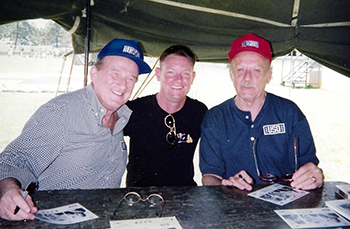
My tour of duty in South Korea was Life changing for me (PTSD not diagnosed yet). I Loved the beauty of the county and the respect of its’ people. I found the South Koreans’ to be very Family-oriented, which I believe was the true strength of their culture. Something We as a Nation used to have and lost.
Additionally, I had the opportunity to meet two Bonafide TV stars in South Korea. While stationed on Camp Humphrys, my unit was in charge of conducting a ceremony to deactivate the last U.S. Army MASH unit in South Korea. As part of the ceremony, two cast members of the TV show MASH were present to sign autographs. My Wife of the time was a big MASH fan and was thrilled when I sent her the autographed photos.
I really don’t have a “Least Favorite” duty station or assignment. I just tried to make the best of anywhere Uncle Sugar (United States) sent me. I had great Mentors and learned something different everywhere I went. Now how can that be beat?
From your entire military service, describe any memories you still reflect back on to this day.
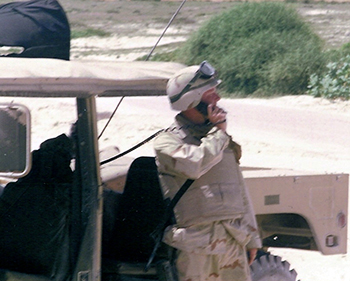
Somalia. An old saying goes, “It does not matter how many atta-boys you got. It only takes one ah-poop to wipe them ALL out”. That would be a good description of my memory process when describing my entire military service. As vibrant as my memories are of the successes I was a part of, it is the failure that comes to mind most often. Sad.
What professional achievements are you most proud of from your military career?
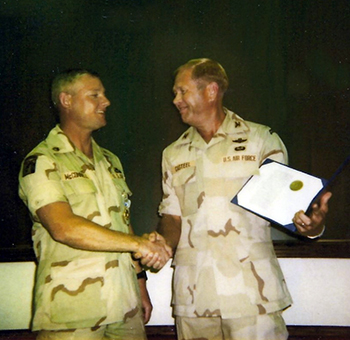
We were conducting an exercise on Fort Bragg, North Carolina, when my boss came to me and said, “Sergeant McConnell, we can’t communicate effectively with our new automation. All of our deployed comm systems operate in analog, and we need to communicate digitally. Now, go fix it.” That was it, and typical of this particular Mentor, “Go fix it.” Fortunately, I was already aware of this problem and had discussed it at great length with our Commo NCOIC. The Commo NCOIC was able to “Tweak” the system and have the analog signal retransmitted to digital. Simple, but it just took pressing the right buttons. The Commo NCOIC received an ARCOM for this achievement and I an AAM.
I got another AAM on my second tour while stationed in the Federal Republic of Germany. One night, I was on C.Q. (Charge of Quarters), and I got really bored. So, around midnight or so, I got the idea to develop a training exercise for the Support troops in my unit. With the U.S. Army Ranger Manual in hand (which I just so happened to have), I put the exercise together, complete with training charts and presentations. By 6 a.m., the project was finished and in the C.O.’s box for review.
I had to go twice through Jump Master school at Fort Bragg, NC. Although it stung my ego to have to do the “Duffle bag drag,” I most certainly believe that I got way more out of the Course the second time, and it made me a better Jump Master in the long run.
Of all the medals, awards, formal presentations and qualification badges you received, or other memorabilia, which one is the most meaningful to you and why?
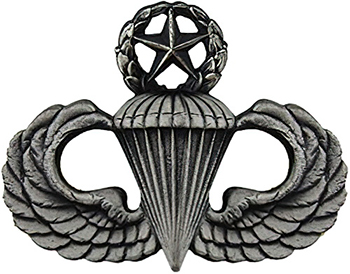
My Master Parachutist Badge. I had to go through the course two times to make it. I quit counting my Jumps after 100 and just wasn’t any real need to count them anymore.
Country of Jordan Senior Parachutist Badge. We were assisting the stand-up of their Airborne School. The only time I ever personally witnessed a troop “Streamer In.” After seeing the chute fail, and four countings in my head, the troop never deployed his Reserve Parachute”. However, he did maintain that good, tight exit body position all the way to the ground. I was impressed.
Which individual(s) from your time in the military stand out as having the most positive impact on you and why?
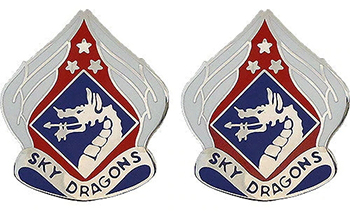
Colonel (Ret.) T. Watson. I served under him when I first got to the XVIII Airborne Corps, having just washed out of Special Forces training. He was then a Lieutenant Colonel and in charge of the G1 Plans and Operations directorate. He constantly challenged me to go above and beyond in everything he tasked me with. As a result, I learned more about being an NCO from this Lieutenant Colonel than any other Mentor or formal instruction that I ever had.
List the names of old friends you served with, at which locations, and recount what you remember most about them. Indicate those you are already in touch with and those you would like to make contact with.
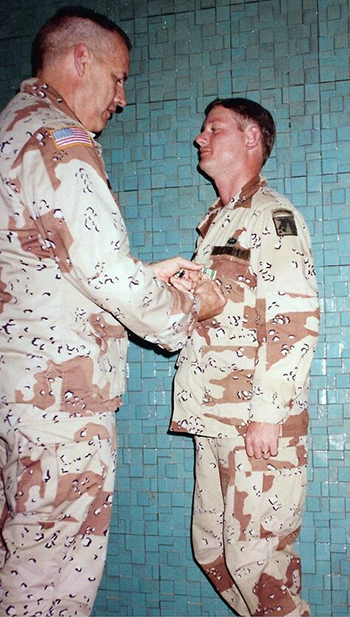
I personally served with some of the best Soldiers, Sailors, Marines, and Airmen this Country could produce. Even after 20 years of military service, I cannot put to memory all of the names of personnel I served with.
A couple stands out, but for the most part, I did not make lasting friendships during my period of service. Guess; for whatever reason, I just thought you didn’t have to worry about losing Friends in Combat if you didn’t have any? Sad
Can you recount a particular incident from your service, which may or may not have been funny at the time, but still makes you laugh?
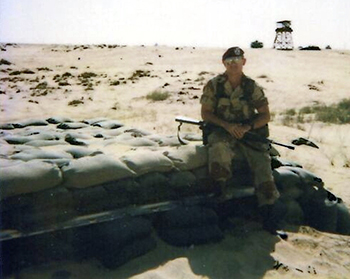
Being on the first aircraft during DESERT SHIELD, the base defense was a priority. With limited recourses on hand, I was put in charge of standing up an initial base defense plan. Along with my Plans OIC (Major J. Houston), we set about identifying avenues of approach and defendable positions. First, of course, lots of sandbagging would be required to bolster hardened defensive positions.
So, we got in the hummer to look for suitable sand to fill our sandbags with. After about half an hour of driving around the perimeter looking for proper sandpits to fill sandbags with, reality struck. Major Houston looked over at me and said, “Mack, we are driving around the Desert looking for Sand.”
We both laughed so hard it looked more like we were crying with laughter, tears streaming down our faces. At the time, that laughter was much needed.
What profession did you follow after your military service and what are you doing now? if you are currently serving, what is your present occupational specialty?
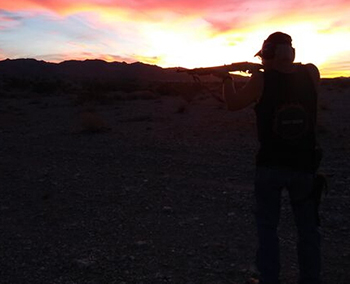
Law Enforcement and Commercial Security. I crashed and burned both of these Careers as a casualty of my undiagnosed PTSD. Medically unemployable since age 50
What military associations are you a member of, if any? what specific benefits do you derive from your memberships?
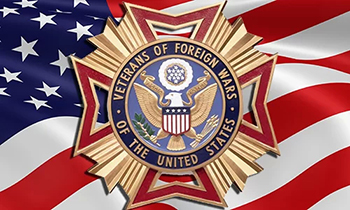
The VFW (Veterans of Foreign Wars) I am a Life Member. The VFW is a visible organization for Veterans, and their activities are very community aware and promote programs that cater to the bonding process that all Veterans are familiar with.
In what ways has serving in the military influenced the way you have approached your life and your career? What do you miss most about your time in the service?
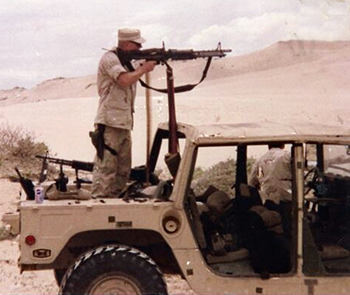
I was an adrenaline junkie, pure and simple. So I got out of Military Service and sought my adrenaline fix through Civilian Service. Law Enforcement and Commercial Security fulfilled that “fix” until my PTSD crashed and burned me hard.
Honestly, I miss the uniform and cool guns. Guess I’m still that 5-year-old little boy marching up and down the driveway with a broom over his shoulder.
Based on your own experiences, what advice would you give to those who have recently joined the Army?
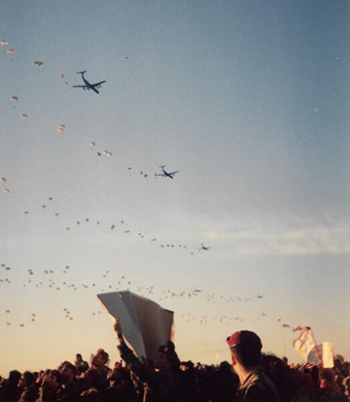
If your focus is on taking care of others only, you are destined to fail. You will be no good to others if you are no good to yourself. It is difficult to lead from the front if your limping; stay fit both Mentally and Physically.
In what ways has togetherweserved.com helped you remember your military service and the friends you served with.
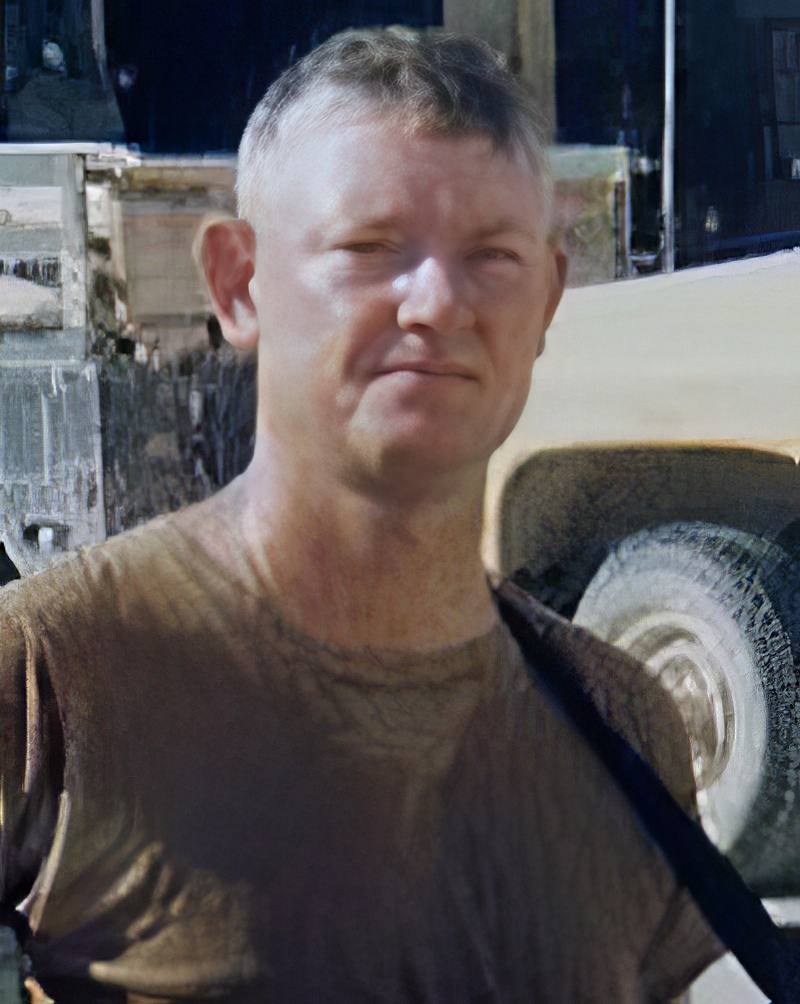
This media has given me the ability to revisit some things in my Military past that I had previously refused to acknowledge or entertain. Refreshing.
PRESERVE YOUR OWN SERVICE MEMORIES!
Boot Camp, Units, Combat Operations
Join Togetherweserved.com to Create a Legacy of Your Service
U.S. Marine Corps, U.S. Navy, U.S. Air Force, U.S. Army, U.S. Coast Guard

0 Comments